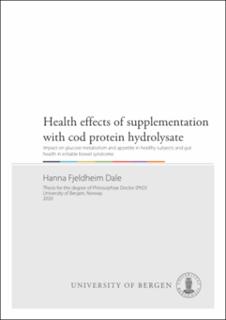| dc.contributor.author | Dale, Hanna Fjeldheim | en_US |
| dc.date.accessioned | 2020-03-27T12:22:28Z | |
| dc.date.available | 2020-03-27T12:22:28Z | |
| dc.date.issued | 2020-04-03 | |
| dc.date.submitted | 2020-03-17T12:49:48.981Z | |
| dc.identifier | container/9a/a8/7c/c1/9aa87cc1-4976-4dd7-97d5-1378aa78881c | |
| dc.identifier.isbn | 9788230851845 | en_US |
| dc.identifier.isbn | 9788230840436 | en_US |
| dc.identifier.uri | https://hdl.handle.net/1956/21611 | |
| dc.description.abstract | Background: Emerging evidence suggest that peptides from fish have several beneficial health effects in the human body. A huge part of the world’s population are affected by life-style diseases related to overweight and obesity, leading to impaired glucose metabolism and other adverse metabolic impairments. In addition, around one out of ten individuals are affected by irritable bowel syndrome (IBS), a diagnosis that most often is only partly controlled by dietary changes and/or pharmacological treatment and cause reduced quality of life. A dietary supplement contributing to increased utilization of residual material from the fishing industry, capable of improve health outcomes related to metabolism and gastrointestinal function, can arguably be regarded valuable both for those individuals affected as well as contribute to a more sustainable industry. Aim: To investigate the effects of a supplement with cod protein hydrolysate (CPH) on glucose metabolism and appetite in healthy subjects, and on gut health in patients with IBS. Method: Three randomized double-blinded clinical intervention studies were conducted. Study 1 was a crossover trial in 41 healthy, middle-aged to elderly adults, and included two study days, with 4-7 days wash out in between. The intervention consisted of 20 mg of CPH (or control) per kg body weight, given before a standardized breakfast meal. Study 2 was a dose-range study in 31 healthy, older subjects receiving four different doses of CPH equivalent to 10, 20, 30 or 40 mg/kg body weight in random order, each dose taken daily for one week, with a week of wash-out in between. Primary outcome in both studies was postprandial response in glucose metabolism, measured by samples of serum glucose, insulin and plasma glucagon-like peptide 1 (GLP-1) (Paper I and III), and secondary outcomes (Study 1) were postprandial acylated ghrelin concentration and sensations associated with appetite (Paper II). Study 3 included 28 patients with IBS randomly allocated to daily supplementation with 2.5 g CPH (n=13) or placebo (n=15) for 6 weeks. Outcomes were evaluated at baseline and after six weeks. Primary outcomes were symptom severity evaluated by IBS Severity Scoring System (IBS-SSS) and quality of life. Secondary outcomes included gut integrity markers (zonulin, lipopolysaccharide-binding protein, intestinal fatty acid binding protein) and pro-inflammatory cytokines in serum, fecal calprotectin and fecal fermentation measured by concentration of short-chain fatty acids (SCFAs) (Paper IV). Results: No differences were observed between CPH and control for postprandial concentrations of glucose, GLP-1, acylated ghrelin or sensation related to appetite, but the postprandial insulin concentration was significantly lower after CPH compared to control (Study 1). No differences in estimated postprandial maximum level of glucose, insulin or GLP-1 were observed when comparing the dose of 10 mg/kg body weight of CPH to 20, 30 or 40 mg/kg body weight, but the estimated maximum value of glucose and insulin was lower for the 40 mg/kg body weight dose than the 10 mg/kg body weight dose (Study 2). Total IBS-SSS scores were reduced in both the CPH group and the placebo group, with no significant differences between intervention and placebo treatment. Concentrations of serum markers and SCFAs did not change for any of the groups (Study 3). Conclusion: Study 1 demonstrated that a single dose of CPH before a breakfast meal reduced the postprandial insulin concentration, without affecting blood glucose response, GLP-1 levels, concentrations of acylated ghrelin or sensations related to appetite in healthy individuals. Study 2 demonstrated that serum glucose and insulin concentrations tended to be reduced with increasing doses of CPH, however no significant effects were observed. Study 3 suggested that 2.5 g of CPH taken daily by IBS patients for six weeks did not affect symptom severity, gut integrity markers, inflammatory markers or fecal fermentation when compared to placebo. | en_US |
| dc.language.iso | eng | eng |
| dc.publisher | The University of Bergen | eng |
| dc.relation.haspart | Paper I: Dale HF, Jensen C, Hausken T, Lied E, Hatlebakk JG, Brønstad I, Hoff DAL, Lied GA. Effect of a cod protein hydrolysate on postprandial glucose metabolism in healthy subjects: a double-blind cross-over trial. J Nutr Sci. 2018;7:e33. The article is available at: <a href="http://hdl.handle.net/1956/19817" target="blank">http://hdl.handle.net/1956/19817</a> | en_US |
| dc.relation.haspart | Paper I:. Dale HF, Jensen C, Hausken T, Lied E, Hatlebakk JG, Brønstad I, Hoff DAL, Lied GA. Acute effect of a cod protein hydrolysate on postprandial acylated ghrelin concentration and sensations associated with appetite in healthy subjects: a double-blind crossover trial. Food Nutr Res. 2019;63:3507. The article is available at: <a href="http://hdl.handle.net/1956/21607" target="blank">http://hdl.handle.net/1956/21607</a> | en_US |
| dc.relation.haspart | Paper III: Jensen C, Dale HF, Hausken T, Lied E, Hatlebakk JG, Brønstad I, Lied GA, Hoff DAL. Supplementation with cod protein hydrolysate in older adults: a dose range cross-over study. J Nutr Sci. 2019;8:e40. The article is available at: <a href="http://hdl.handle.net/1956/21608" target="blank">http://hdl.handle.net/1956/21608</a> | en_US |
| dc.relation.haspart | Paper IV: Dale HF, Jensen C, Hausken T, Hatlebakk JG, Brønstad I, Valeur J, Hoff DAL, Lied GA. Effects of a cod protein hydrolysate supplement on symptoms, gut integrity markers and fecal fermentation in patients with irritable bowel syndrome. Nutrients. 2019;11(7):e1635. The article is available at: <a href="http://hdl.handle.net/1956/20996" target="blank">http://hdl.handle.net/1956/20996</a> | en_US |
| dc.rights | In copyright | eng |
| dc.rights.uri | http://rightsstatements.org/page/InC/1.0/ | eng |
| dc.title | Health effects of supplementation with cod protein hydrolysate: Impact on glucose metabolism and appetite in healthy subjects and gut health in irritable bowel syndrome | en_US |
| dc.type | Doctoral thesis | |
| dc.date.updated | 2020-03-17T12:49:48.981Z | |
| dc.rights.holder | Copyright the Author. All rights reserved | |
| dc.contributor.orcid | https://orcid.org/0000-0002-0710-6057 | |
| fs.unitcode | 13-24-0 | |
